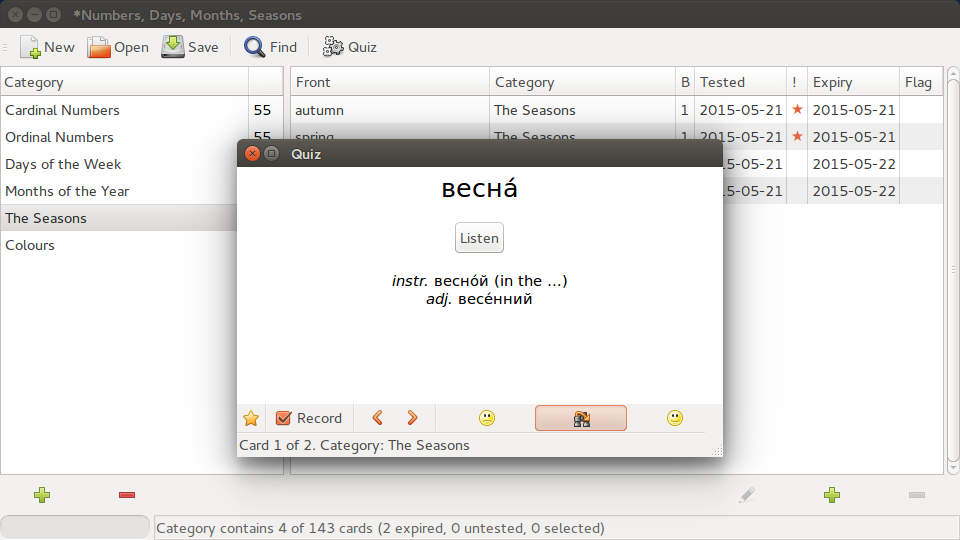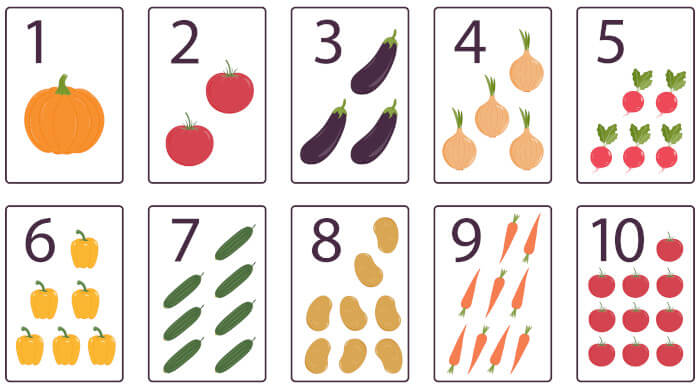iGNUit is a memorization aid based on the Leitner flashcard system. The program can be used for both long-term and short-term learning.
It has a GNOME look and feel, a good selection of quiz options, and supports UTF-8. Cards can include embedded audio, images, and mathematical formulae (via LaTeX).
It can import and export several file formats, including CSV. iGNUit can be used for both long-term learning and cramming.
A traditional flashcard is a small rectangular card with a word, phrase, or question written on one side, and the translation or answer written on the other side. Repeatedly picking up flashcards and trying to remember what’s written on the reverse side is a good way to memorize things.
The Leitner flashcard system, invented by Sebastian Leitner (1919 – 1989), is an efficient way to manage time spent learning with flashcards.
In this system, you have a series of boxes numbered from one up to, let’s say, eight. You begin by placing all of your flashcards in box number one. Test yourself with box one’s cards daily. If you can’t remember what’s written on the reverse of a card, return it to box number one. If you can remember what’s written on the reverse, drop the card into box number two. The cards in box two are tested every three days. Any of those that you remember can be moved to box number three, which you’ll only look at every seven days. And so on, up to box eight, with increasing time intervals per box. Whenever you can’t remember what’s written on the back of a card, that card returns to box number one, regardless of which box it was last in.
You end up spending less time on the cards you know well, and concentrating more on the ones you don’t know so well.
Electronic flashcard programs like iGNUit automate this system.
Features include:
- Drill mode.
- LaTeX support (optional).
- Search.
- Undo and redo.
- Exclude native markup when exporting to CSV or TSV.
- jMemorize and Mnemosyne compatibility.
Website: trmusson.dreamhosters.com
Support: Mailing List
Developer: Timothy Richard Musson and contributors
License: GNU General Public License version 3.0
Dependencies:
libgnomeui >= 2.24.5 (libgnomeui-dev)
libglade >= 2.6.4 (libglade2-dev)
gconf-2.0 >= 3.2.6 (libgconf2-dev)
libxslt >= 1.1.28 (libxslt1-dev)
gstreamer >= 1.8.2 (libgstreamer1.0-dev)
intltool >= 0.50.0

iGNUit is written in C. Learn C with our recommended free books and free tutorials.
| Popular series | |
|---|---|
| The largest compilation of the best free and open source software in the universe. Each article is supplied with a legendary ratings chart helping you to make informed decisions. | |
| Hundreds of in-depth reviews offering our unbiased and expert opinion on software. We offer helpful and impartial information. | |
| The Big List of Active Linux Distros is a large compilation of actively developed Linux distributions. | |
| Replace proprietary software with open source alternatives: Google, Microsoft, Apple, Adobe, IBM, Autodesk, Oracle, Atlassian, Corel, Cisco, Intuit, SAS, Progress, Salesforce, and Citrix | |
| Awesome Free Linux Games Tools showcases a series of tools that making gaming on Linux a more pleasurable experience. This is a new series. | |
| Machine Learning explores practical applications of machine learning and deep learning from a Linux perspective. We've written reviews of more than 40 self-hosted apps. All are free and open source. | |
| New to Linux? Read our Linux for Starters series. We start right at the basics and teach you everything you need to know to get started with Linux. | |
| Alternatives to popular CLI tools showcases essential tools that are modern replacements for core Linux utilities. | |
| Essential Linux system tools focuses on small, indispensable utilities, useful for system administrators as well as regular users. | |
| Linux utilities to maximise your productivity. Small, indispensable tools, useful for anyone running a Linux machine. | |
| Surveys popular streaming services from a Linux perspective: Amazon Music Unlimited, Myuzi, Spotify, Deezer, Tidal. | |
| Saving Money with Linux looks at how you can reduce your energy bills running Linux. | |
| Home computers became commonplace in the 1980s. Emulate home computers including the Commodore 64, Amiga, Atari ST, ZX81, Amstrad CPC, and ZX Spectrum. | |
| Now and Then examines how promising open source software fared over the years. It can be a bumpy ride. | |
| Linux at Home looks at a range of home activities where Linux can play its part, making the most of our time at home, keeping active and engaged. | |
| Linux Candy reveals the lighter side of Linux. Have some fun and escape from the daily drudgery. | |
| Getting Started with Docker helps you master Docker, a set of platform as a service products that delivers software in packages called containers. | |
| Best Free Android Apps. We showcase free Android apps that are definitely worth downloading. There's a strict eligibility criteria for inclusion in this series. | |
| These best free books accelerate your learning of every programming language. Learn a new language today! | |
| These free tutorials offer the perfect tonic to our free programming books series. | |
| Linux Around The World showcases usergroups that are relevant to Linux enthusiasts. Great ways to meet up with fellow enthusiasts. | |
| Stars and Stripes is an occasional series looking at the impact of Linux in the USA. | |
